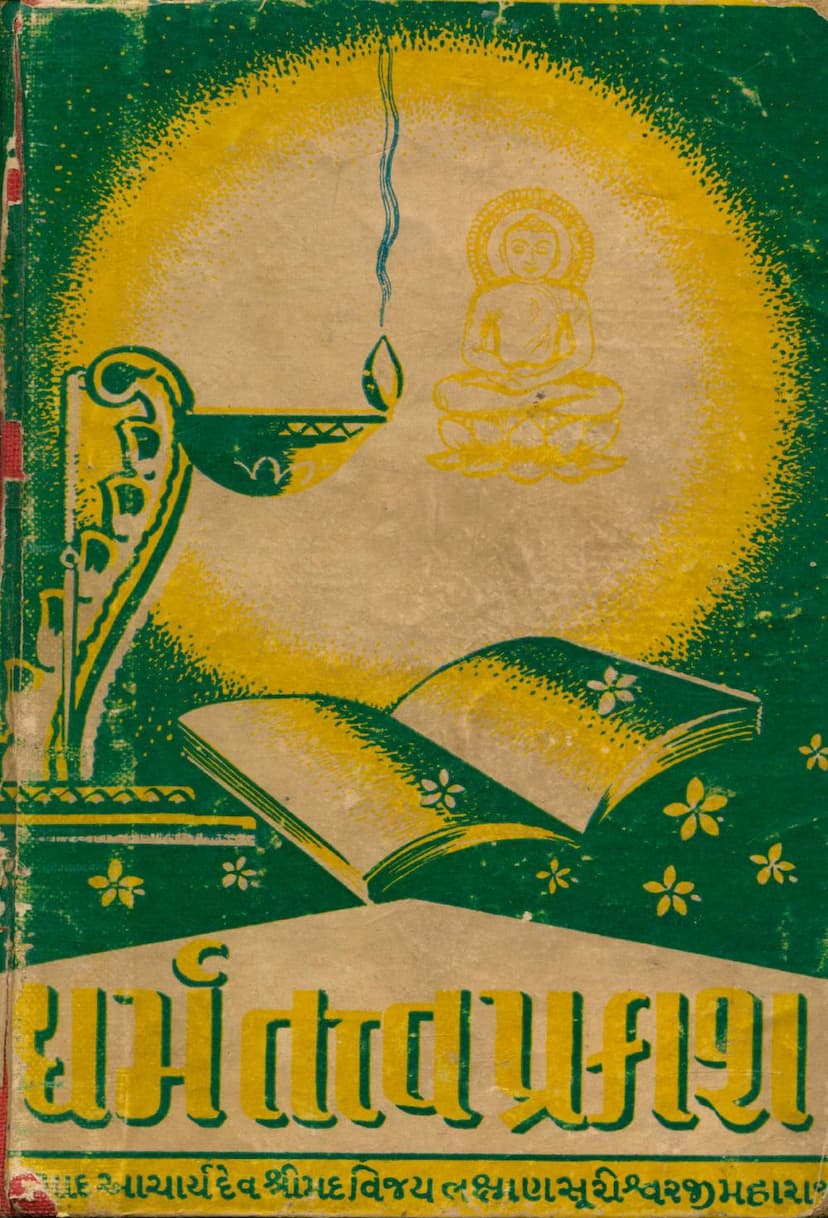Dharm Tattva Prakash
Added to library: September 1, 2025

Summary
Based on the provided text, here is a comprehensive summary in English of the Jain text "Dharm Tattva Prakash" by Vijaylakshmansuri:
Book Title: Dharm Tattva Prakash (The Light of Dharma Principles) Author: Vijaylakshmansuri Publisher: Aatmkamal Labdhisuri Jain Gyanmandir, Dadar, Mumbai. Catalog Link: https://jainqq.org/explore/023319/1
Overview:
"Dharm Tattva Prakash" is a compilation of profound and enlightening discourses (vyakhyanas) delivered by the highly respected and eloquent Jain Acharya, Shrimad Vijaylakshmansurishwarji Maharaj. The book is presented as a collection of these talks, aimed at illuminating the true essence of Dharma (righteousness, duty, path) for the spiritual upliftment of its readers.
Key Themes and Content:
The book delves into various fundamental aspects of Jain philosophy and practice, aiming to guide individuals towards self-realization and liberation (moksha). Based on the detailed breakdown of the lectures (vyakhyanas), the core themes covered include:
-
The Nature and Importance of Dharma: The text begins by emphasizing that Dharma is the supreme essence and the ultimate source of all happiness and well-being in the world. It's presented as the foundation for a meaningful human life, leading to spiritual progress and ultimate liberation. The lectures explore the fundamental principles of Dharma, its significance, and its ultimate fruits.
-
The True Essence of Dharma (Dharm Swarup): A significant portion of the text is dedicated to defining what Dharma truly is. It's explained as the inherent nature (svabhav) of the soul. The lectures differentiate between the soul's pure, inherent nature and the temporary, external states influenced by karmas and external circumstances. The text emphasizes that external rituals or actions alone do not constitute Dharma; rather, it resides in the inner purity and the true nature of the soul, characterized by qualities like non-violence (ahimsa), self-control (sanyam), and austerity (tapa).
-
The Significance of Righteous Conduct (Samyak Charitra): The book stresses that knowledge alone is insufficient. True spiritual progress comes from the integration of right faith (Samyak Darshan), right knowledge (Samyak Gyan), and right conduct (Samyak Charitra). The importance of living a life guided by ethical principles and disciplined behavior is highlighted.
-
The Power of Faith (Shraddha/Samyak Darshan): A crucial element discussed is the foundational role of faith in Jainism. The text explains that unwavering faith in the teachings of the omniscient beings (Jineshwar), the scriptures, and the principles of Jainism is paramount. Without genuine faith, even the most rigorous practices may not yield the desired spiritual results. The text illustrates how even a fleeting moment of true faith can have profound and lasting impact.
-
The Value of Knowledge (Gyan) and Conduct (Kriya): The book emphasizes the inseparable nature of knowledge and action. Mere intellectual knowledge without practical application is deemed incomplete, just as action without knowledge is blind. Both are essential for the path to liberation.
-
The Role of Austerity and Renunciation (Tapa & Tyaga): The importance of self-discipline, fasting, and renouncing worldly pleasures (tapa and tyaga) is highlighted as essential practices for purifying the soul and overcoming karmic bondage. The lectures draw examples from the lives of Tirthankaras and great souls who embraced severe austerities for spiritual advancement.
-
The Nature of Happiness (Sukha): The text distinguishes between worldly, fleeting happiness derived from external sensory pleasures and the eternal, inherent bliss of the soul. It argues that worldly happiness is temporary, conditional, and ultimately leads to suffering, whereas true, lasting happiness is found within the purified soul, free from all karmic influences.
-
The Impact of Karma (Karma Tattva): The lectures touch upon the law of karma, explaining how actions (karma) have consequences and how individuals' present circumstances are a result of past deeds. Understanding the intricacies of karma is presented as crucial for spiritual growth and liberation.
-
The Importance of Proper Intent and Devotion (Bhavana): The book stresses that the intention and devotion behind religious practices are as important as the actions themselves. Pure, selfless devotion (nishkama bhakti) is presented as the most potent form of spiritual practice.
-
The Teachings on Jain Principles: The text likely draws heavily from core Jain scriptures like the "Dashavaikalika Sutra" and "Upadesh Mala," explaining their principles in a simple, accessible, and engaging manner.
-
Illustrative Stories and Examples: The discourses are enriched with compelling narratives and anecdotes (like the story of Aram Shobha and the examples of Nand Maniyar, Arjun Mali, and Punyadhara Raja) that illustrate the philosophical points and make them relatable to the audience. These stories serve to emphasize the principles of cause and effect, the consequences of good and bad deeds, and the transformative power of devotion and righteous living.
-
The Role of Gurus and Spiritual Guidance: The text implicitly and explicitly emphasizes the vital role of enlightened spiritual teachers (Gurus) in guiding individuals on the spiritual path. The importance of seeking their counsel and following their teachings is underscored.
-
The Significance of the Navkar Mantra: The Navkar Mantra is repeatedly highlighted as a powerful tool for spiritual purification, protection, and ultimately, liberation. Several examples are provided to showcase its efficacy in overcoming adverses and transforming lives.
Sponsorship and Editorial Contributions:
The book's publication is supported by various religious patrons and organizations, as indicated by the acknowledgments and dedications. The compilation and editing were meticulously done by Acharya Dev Shrimad Vijaykirtichandrasuriji Maharaj, a disciple of the author. The preface and endorsements from other respected scholars and Acharyas further attest to the book's authenticity and spiritual significance.
Overall Message:
"Dharm Tattva Prakash" serves as a comprehensive guide to living a spiritually fulfilling life according to Jain principles. It aims to inspire readers to cultivate inner purity, practice righteousness, and strive for the ultimate goal of liberation by understanding and internalizing the profound truths of Dharma. The book is lauded for its accessible language, profound insights, and the eloquence of its author.